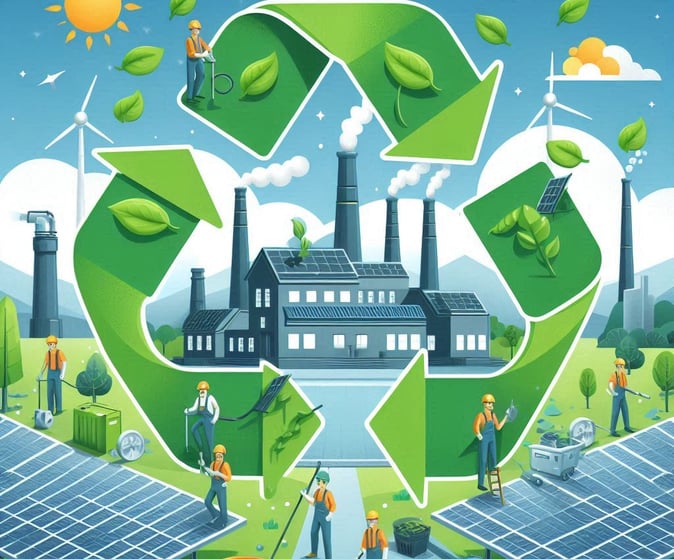The Circular Economy of Solar Panels: A Sustainable Solution
5/1/20242 min read


The Circular Economy of Solar Panels: A Sustainable Solution
The rapid growth of the solar energy industry has brought about numerous benefits, including reduced carbon emissions and increased energy efficiency. However, the production and disposal of solar panels also pose environmental challenges. To address these concerns, the concept of recycling has emerged, leading to the creation of a circular economy for solar panels. This innovative approach not only mitigates the environmental impact of solar panel production but also offers economic and social benefits.
Reducing Waste and Resource Depletion
One of the key advantages of the circular economy for solar panels is the reduction of waste and resource depletion. By recycling solar panels at the end of their life cycle, valuable materials such as silicon, silver, and aluminum can be extracted and reused in the production of new panels. This reduces the need for extracting raw materials from the earth, minimizing the environmental impact associated with mining and processing.
Moreover, recycling solar panels prevents the accumulation of electronic waste. Solar panels contain hazardous substances like lead and cadmium, which can leach into the environment if improperly disposed of. Through recycling, these harmful materials can be safely recovered, ensuring their proper management and minimizing the risk to human health and the ecosystem.
Promoting Energy Independence and Cost Savings
Another significant benefit of the circular economy for solar panels is the promotion of energy independence and cost savings. By recycling solar panels, the availability of raw materials is increased, reducing the reliance on imports and ensuring a stable supply chain. This enhances energy security and reduces the vulnerability to price fluctuations in the global market.
Furthermore, recycling solar panels helps to drive down the cost of production. The reuse of materials reduces the overall manufacturing expenses, making solar energy more affordable and accessible for consumers. This not only benefits individual households but also encourages the adoption of solar energy on a larger scale, contributing to the transition towards a sustainable and low-carbon future.
Creating Job Opportunities and Economic Growth
The circular economy for solar panels also generates job opportunities and fosters economic growth. The recycling industry requires skilled workers for the collection, dismantling, and processing of solar panels. As the demand for recycling increases, new jobs are created, providing employment opportunities for local communities.
Moreover, the growth of the recycling sector stimulates economic development. It encourages investment in recycling infrastructure and technology, leading to the establishment of new businesses and the expansion of existing ones. This contributes to the growth of the green economy, creating a ripple effect that extends beyond the solar energy industry.
In conclusion, the circular economy for solar panels offers a sustainable solution to the environmental challenges associated with their production and disposal. By reducing waste, promoting energy independence, and creating job opportunities, recycling plays a vital role in the transition towards a more sustainable and circular economy. Embracing this approach not only benefits the environment but also contributes to economic and social well-being.
